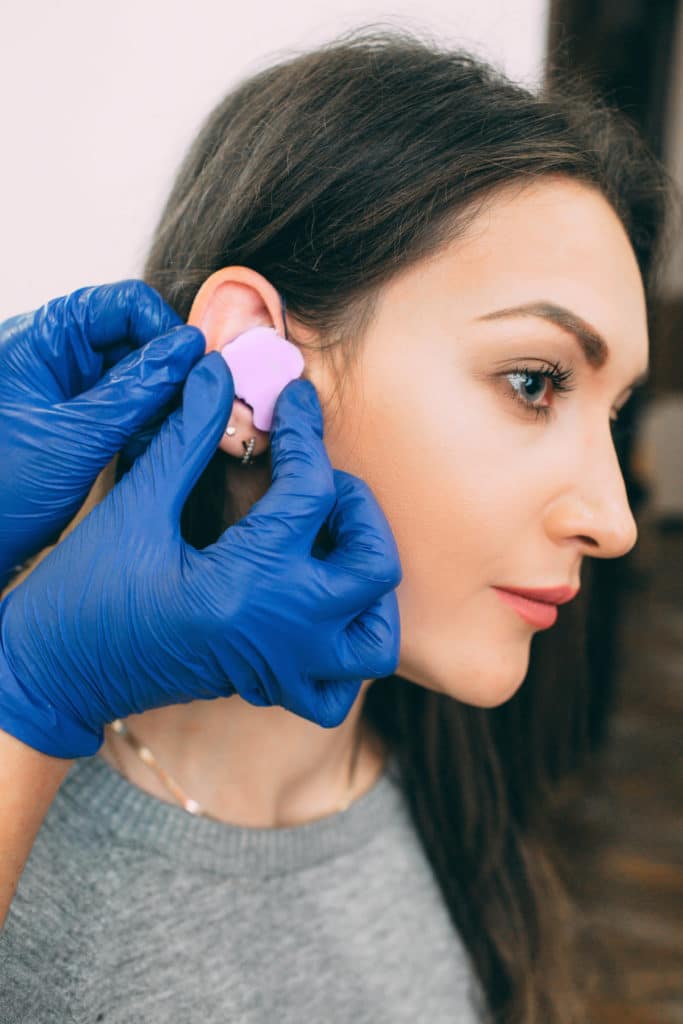
At first glance, the appeal of OTC hearing aids is easy to see.
- There’s no need to consult with an Audiologist in advance.
- You don’t need a prescription.
- OTC aids are marketed as having a sleeker design and less noticeable.
- They are far less expensive than conventional hearing aids.
The cost of OTC hearing aids, on average, ranges between $370 and $1,500 each, Which can be a substantial saving over conventional hearing aids. But the real question we need to ask is, do they carry through?
The Truth With Over-The-Counter Hearing Aids

MarkeTrak discovered that people with hearing loss wore their OTC hearing aids only 30% of the time compared to 83% satisfaction rate for prescribed hearing aids, based on Marketrak 10 survey.
Although the cost may be significantly less for OTC hearing aids, they are a one size fits all solution in a world where one size does not fit all. Since you don’t know your degree of hearing loss, there is a strong chance that OTC aids will not help with your specific hearing loss and can potentially even damage your hearing if not used properly.
When selecting prescription hearing aids, the audiologist or hearing instrument dispenser will fine-tune the hearing aid to amplify specific frequencies that your ears have trouble hearing. Whereas OTC aids are generally amplifying a more extensive range of frequencies, some of which you might not experience trouble hearing.
Here are some of the limitations you find with OTC hearing aids.
- OTC hearing technology is not regulated, meaning there is no assurance of quality.
- Although they’re marketed to work for “everyone,”- they are designed for mild to moderate hearing loss.
- Lower cost generally means fewer options and functionality. Some OTC hearing aids have programmability options, but you have to send them to the seller for customization. This requires taking an online hearing test, which is not nearly as accurate as seeing your Audiologist or hearing instrument dispenser.
However, the most significant limiting factor isn’t a feature or a function. Rather the benefit or lack of not having an audiologist’s help. This is what OTC manufacturers hang their hats on, removing the middle man to save you money.
But therein lies the problem. Because, Audiologists are not “middlemen,” and not seeing one before purchasing a hearing aid can potentially cost you more than just money and time. It can cost you your hearing health in the long run.

What Do Audiologists Do?
An Audiologist helps identify and treat hearing, balance, tinnitus, and other auditory disorders at the most basic level. They help those suffering from these disorders to better communicate and connect with everyone around them, with the use of prescription hearing aids.
This is where OTC devices fall flat. Below are three reasons audiologists are far more than a middle man:
Complete Testing
Many factors can contribute to hearing loss, including age, injury, infection or disease, and excessive exposure to loud noise. Having an audiologist do a full evaluation of your hearing to determine the correct type of hearing loss and cause is a pivotal part of the hearing aid selection process.
Fitting and Customizing
Not all hearing aids are created equal. Depending on your lifestyle and hearing loss, an Audiologist can help you select the right device for you.
This is a process that over-the-counter hearing aids can’t replicate, with a one size fits all approach, which is crucial for their low-cost business model. The result when eliminating this process is that people stop using their hearing aids. Add to the fact that there is no option for a “custom fit” and additional discomfort, and you are, again, less likely to wear them.
Auditory Deprivation
When hearing loss is left untreated, our auditory system is left distressed. When this happens, the result is atrophy of the brain’s auditory nerves and speech processing areas. This atrophy is called Auditory Deprivation. Once auditory deprivation has taken place, restoring hearing through hearing aids becomes much more difficult.
This can occur when wearing incorrect hearing aids for extended periods. It can train the brain to no longer receive or need specific auditory pathways. Your hearing ability can slowly decline, sound clarity can soon begin to suffer, and your brain will have to work harder to fill in the gaps.
It’s a very similar process to wearing the wrong eyeglass prescription for long periods. Over time, your sight will decline.
There is a comprehensive industry push to make OTC safer for the consumer, with more strict guidelines and manufacturing standards, and to inform with better transparency about the risks associated with unregulated hearing aids.
Because there is still a wait for the FDA to create these recommendations, they have not been implemented yet. You run the risk of gambling with your hearing health should you choose to wear OTC hearing aids that have not been properly fitted and customized by a licensed professional.
Our Approach to Hearing Aid Fitting and Customization
At Salem Audiology Clinic, our goal is to help reconnect you with the world around you.
We do that by:
- Conducting in-depth screenings, including Real-Ear-Measurements, to properly fit you based on various simulated environments to better tune your hearing instruments to your exact level of hearing loss.
- Helping you select the right hearing aids for your specific lifestyle. We carry an array of hearing aids from all of the top providers. From fit to form and, of course, amplification, we will find the hearing aid that best fits you. In most cases, we can also help customize hearing aids that haven’t been purchased from us.
- We have programs available to allow you to try some of the best hearing devices on the market and compare them to what you are currently using or have never had hearing aids experience the difference.
Experience the Difference
Buying an OTC hearing aid will not guarantee better hearing; it won’t help block out excessive background noise, and as a “one size fits all,” unfortunately won’t fit all. Studies have shown greater satisfaction and likelihood to wear your hearing aids much more when matched to your specific needs.
The time and level of care that we give to each patient help promote higher hearing device usage. On top of that, we offer many free educational resources to keep our patients (and potential patients) informed to make the best choices for themselves.
If you would like to learn more about our hearing loss approach, please schedule an appointment with us today.
